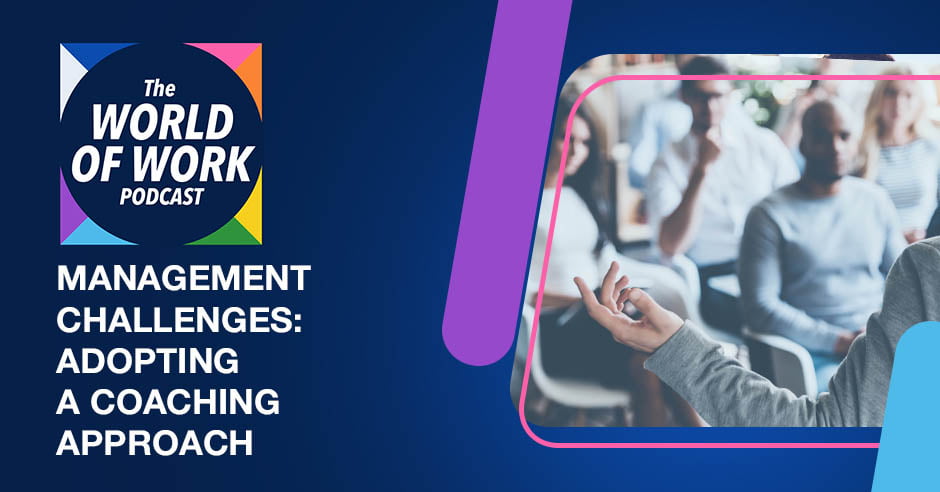
There is never a dull day in management. No matter the highs, there will always be management challenges to overcome. Good thing you are not alone in this position. You can always find people who can help you navigate this path. Introducing a new series, James Carrier and Jane Stewart are your new Agony Aunts to give advice on the management challenges we are facing today. In this pilot episode, they dive deep into what happens when a manager wants to transition to a more coaching approach in their team. Should stepping back and giving the power to your employees’ hands the way to a better organization? What are its pros and cons? How do you prepare your team for that transition? Join James and Jane in this conversation as they give answers and more, guiding you about figuring out if a coaching approach fits you!
—
Listen to the podcast here
Management Challenges: Adopting A Coaching Approach
We are going to be doing something a little bit different. We are going to be doing a series of episodes that are for the two of us. Jane, what are we doing on the series and what are we doing now?
This is the first episode of a new series. It is a different take than we have done before. We have been having a chat about what we think are big challenges in the world and what are the challenges that managers face in the workplace. We are going to be doing a whole series of your and my reflections on how to address a challenge, a problem, or a situation in the workplace that a manager might be right in the middle of.
We might occasionally have guests in to help us think this through. That will be great. The idea is to focus each episode on a specific situational challenge. We hope that readers will enjoy it but also think about how they might approach those challenges. We want to hear from you if you got different ideas and thoughts. We also want to hear from you if there is a particular challenge you would like us to talk about. Feel free to get in touch on our social media.
We are going to be talking about what happens when a manager wants to create or transition to a more coaching culture or coaching-led approach in their team. For each episode, we will start by explaining a little bit of the situation or the context. James is going to talk to you about the situation we are imagining. We are going to share our reflections on our experiences with this challenge or situation.
We will talk about some of our thoughts on how we might go about doing it. Some of the challenges that people might face and questions they might want to start asking at the beginning of the journey to see if they are ready. If they understand, how are they going to go about it? Some of the signs of when you succeeded. We are going to talk through the process of how understanding, addressing, and managing a solution to a challenge or situation. We will wrap up, check out and leave you to enjoy and reflect on what we have been talking about.
I’m excited about this. It is going to be great for us to be talking through these different challenges, exploring a little bit at the moment, and trying to navigate through and share our thoughts. If you do have specific challenges you are interested in, please do share. It is always great to hear about dilemmas people are facing. Please do get in touch with us.
What is the specific context that we are looking at? We are looking at somebody who wants to make that shift more of a coaching approach or a coaching culture in their team. They are an individual manager. They are looking to start this off and make these changes. The manager was thinking, “You are going to be competent already. You and your team are going to be doing well. You have been managing for a couple of years.”
No concerns. Things are good, but somewhere along the way, you heard about coaching as an approach or a coaching approach to management. You like to make that jump. You are not sure where to go, but you got a sense this could be good for you. The wider organization you are part of isn’t resistant to coaching, but it doesn’t have much of a view. It doesn’t have an intentional approach to adopting a coaching approach across teams. It is not resistant, but it is not part of a wider culture and your manager doesn’t know much about coaching.
They are happy for you to try something. You got a good relationship with them. They are happy for you to give it a go. If you think it will help, they will trust you to try stuff, but they don’t have the knowledge or resources to help you. They are going to observe you a little bit along this journey without having too much great insight to share with you on it. That is where we are. That is the context we are looking to explore. Jane, have you been here yourself? Have you seen other people here? What is your sense of this as a context or situation for managers?
Aside from the fact that our readers know well enough to know, we wouldn’t have started with the context we haven’t experienced. I have mixed feelings about starting with this one because I still have conflicting feelings about this being done well and proportionately, inappropriately with the right people. I have experienced it because I was woefully poor at it early in my career as a manager.
For those of you who know, I worked in event operations. It has a fairly low tolerance for mistakes because of the health and safety aspects and the risk. Therefore, it would be fair to say that I was fairly dictatorial about the way things should be done, and finding out that wasn’t the best way to develop people. It was a bit of a shock to the system. This is a context we see quite a lot now with managers who, fortunately, are much more enthusiastic about it and in organizations you described in the context or scenario.
They are not in bad places. They are in good places, but the managers are a little bit distant from them. They are like, “You crack on it.” If you want to move to a more coaching-led approach, great, but you still need to deliver the work you are doing. We will let you get on with it. A lot of managers don’t know where to start. Sometimes we see that in some of our client work.
It crops up the most when we are doing other work. We are doing a project with someone around psychological safety or change management. In doing so, it becomes apparent there are lots of brilliant managers who are maybe in a hierarchical situation with the way they delegate and give people tasks. We can see potential in those people working for them. Those managers are open to it, but they are not sure where to start.
Lift the experience of the ongoing personal battle to balance between coaching, giving people space to fail, and understanding relatively middle to high-reliability requirements of safety and responsibilities. Try to balance the two. I commonly see it in places where there has been no management training and personal development is left to the individual because they have gone off and explored. They were, “I want to be a more coaching-led manager.” There is no practicality to it. That would be my experience. What about you, James? Where have you seen it? Have you seen it? Have you experienced it?
My natural state of communicating and working with people fits a little bit more into that coaching style. That fits a little bit with my personality. I always wanted to be in that space. Throughout my career, when I moved into management and managed larger teams, I didn’t know what that was like or how to go about it. I had the desire to be in that space, but I didn’t know how to navigate it well and what it was like or have a language or confidence around it. I have experienced and lived that myself in the desire to get there.
I have been in teams that had no knowledge of this. It is an alien word for people. I have been in that space and seen it with clients. Similar to you, when people talk about other challenges they are facing at a management level, at a team, or organizational level. Sometimes this move to coaching falls out of those conversations as something they are desirous of doing but necessarily knowing about at the start of the situation.
Something else I have seen a few times when I have been speaking to people is this sense in organizations that our way of managing isn’t working. People have this knowledge of the old way of managing but a more hierarchical approach. It doesn’t necessarily work for them in their organizations, but they don’t know where to go. I’m not saying that the coaching approach is the ultimate solution for those types of things, but it is something worth exploring when we are challenging that scientific management terrorism approach that a lot of organizations still have and looking to shake up a little bit.
I have spoken to people who are maybe a little bit more senior who feel that something needs to change but don’t quite know what that is and how you empower more and bring some of those alternate ways of doing things. I see it come out in those situations. In those larger situations, it shifts toward this broader way of doing things feels a little bit as it sits in the culture change space as well as the leadership and management development space.
I love having those conversations. I love when leaders challenge management thoughts that exist, and their organization can be better. It is not right for everyone, but it is great to be having those conversations and looking for something better, a little bit newer, and more contemporary. Those are my thoughts. We have touched on it a little bit here, but why might somebody want to do this, or how do you think somebody might face this? They have heard about coaching or the coaching approach as a manager. Why might they have their curiosity piqued and be interested in doing this? What might the draw be?
There is increasing literature academically on the role of coaching and how it influences people’s skills development, learning development, performance, and teams. There is some good evidence out there that a coaching approach can be integral. I’m always more interested in something like this, where I have seen it most work. Therefore, why might it be a benefit to some teams? I have not been looking at the literature and academic stuff.
The thing I always come back to, and maybe it is quite a selfish spec as an ex-manager, is you are teaching people quite often how to better make the decision, take on or solve the problem rather than approving a solution. When you coach someone, they go through the process of understanding. If you do it well, you go through that process together of how to approach a problem, solve a problem, design a project, or whatever it is you are doing with them.
They are much more likely to remember it and also feel skilled to be able to attack maybe a different problem next time. That means your job is easier but also more interesting because my experience with some of the teams I have worked with myself is that your job gets more interesting when you coach because they might do it differently. As you can imagine, I dealt with it interestingly.
That be amazing to watch.
How dare you do it differently and potentially even as well but in a completely different way. What a treat. I think that’s much more interesting. Also, it creates people who work for you on paper but who are better at being your peer of discussion, thinking, and exploration. That makes the job more interesting. I realized that is not the obvious place to start about why someone might do it.
Once I cottoned onto that, I was like, “I’m doing this all the time because I no longer feel alone in this management position thinking through these problems because I now have all these people who work for me but who are beginning to understand how to approach things in a more meta or holistic way rather than taking direction.
Those people were more creative once they had that of how to expand their role, not necessarily with more work but expanding their thinking around stuff. There are some interesting debates at the moment about the evidence of how effective it is and who for. Making the manager role more interesting and engaging and keeping good managers learning as a different twist is something I get excited about. That will always be the sell for me to managers.
It does for me, and maybe not for everyone. It creates a more interesting managerial role, a different set of challenges, and a different way of doing things. It is intellectually stimulating and it changes some of the relationships. When I have adopted a more coaching approach, I feel a little bit mentory, less bossy, and more connected. That is more rewarding in those roles.
I’m also quite a believer that if we can adopt approaches like this well, we can create better outcomes for people as well. We can help them be more creative, have more enjoyment in their work, have more sense of agency, and learn more, which we know is great. We can have all those organizational benefits and benefits for people working for us as well as benefits for ourselves. It does feel like a win-win.
Not all these things are right for everybody and not right in every organization or every context, but it is a win-win and helps us as managers have better experiences. It helps our direct reports have more growth and development, and everybody be a little bit better at their jobs. We will perform a little bit better as a team. It feels good to me.
I wanted to ask. I thought it might be useful at this stage to explain what we mean by a coaching environment or coaching management. It occurs to me that if someone is reading, they haven’t come across this scenario. We might have different perspectives. I will go first. I’m going to share a definition from MIT, Massachusetts Institute Technology, which is coaching defined as an ongoing approach to managing people. It creates a genuinely motivating climate for performance. It improves the match between an employee’s actual and expected performance. It increases the probability of an employee’s success by providing timely feedback, recognition, clarity, and support.
Although this doesn’t exactly define it, it is helpful because there are two bits I want to call out the IC Coaching. One is the ongoing approach. The way I managed early in my career was much more transactional, project-based, task-based, and let’s talk about this thing and then this thing, whereas coaching felt like a much longer process where we had clarity about the spaces and places where the person wanted to grow. I looked for little opportunities at the right time.
Coaching is an ongoing approach.
That is why I wanted to use that definition for mine because it also provides timely feedback, recognition, clarity, and support. It is about interweaving your advice, expertise, support, and great questions. Forget people’s thinking in the journey of that employee, so they are able to pick and choose from it. It is all about helping them reach their goals and keeping an eye on that main goal a person wants to get. Maybe they want to get better at holding people to account. Rather than telling them how I would do it, it would be about seeing all the opportunities in their career and giving them a little nudge, praise, or asking them questions about why they had done it a certain way at the moment. I know that’s not how everyone thinks about it, but it was strike rings quite true.
I like the stuff MIT produced. It is nice and good. What you have shared there feels good. If I were to describe the coaching approach in my own words, it is on the destination and helping somebody work out how to get there without giving them specific steps to get there. That conversation about where we want to be, what an objective is, and the role as a manager becomes that questioning in supporting timely feedback and celebrating success to help them navigate that journey themselves to get to that endpoint. To be there as a support function and guide rails to make sure they don’t go too far off and help them learn, question, and own that journey from wherever they are now to that objective you are trying to reach as an organization.

Management Challenges: A coaching approach is focusing on the destination and helping somebody work out how to get there without giving them specific steps to get there.
It is about reducing hierarchy within the team and increasing the empowerment of the individual there so they can grow and create what needs to be created to get to where they want to get to. That’s a big part of it for me is about helping somebody own it, learn, and help trust along the way to navigate to where they want to be. That sums up my thoughts on this. You talk about questions. Using that questioning approach to help people navigate through, learn things and find their realizations as they make that path. That is what I’m speaking about.
A coaching approach is about reducing hierarchy within the team and increasing the empowerment of the individual.
We have talked a little bit about the why and the what it is in our words. There are loads of different great resources out there to talk about it in more detail. That asks the massive question, if it has so much potential, why doesn’t everyone do it? It can’t just be resistance from the whole organization. That is not the only reason people don’t do it.
Thinking about my experience and some other people, I feel like sometimes people don’t know. Sometimes we don’t know that there are other ways to do it. Sometimes we replicate what is gone before us and the way we have been managed. We might feel like we don’t know where to start. It could be a little bit daunting. We don’t know these things.
When I did some of this stuff in larger organizations, even the word coaching, it was like, “What is that?” People had a lack of knowledge in some ways. I know that has changed a few years ago, but there is part of that. There is this mirroring the way you have been managed. If you have not been managed this way, you wouldn’t know to manage this way. Sometimes people are a little bit worried about those types of places going against the wider culture. They might lack a bit of confidence, trust, and language to start this journey off. What is your view?
There is concern that you won’t get immediate results as quickly in the output you might be doing as if you tell someone how to do it and that it sometimes takes up more time. That is true in the short term. In the beginning, I was saying, “I feel a bit complex about this. There are scenarios where I have watched people try to coach someone toward any solution. That person isn’t in the mental frame of mind. They want to be told. They were like, “Tell me how to fix this. We can do all the coaching, but can you at this moment tell me how you would fix this so I can go and fix it and stop feeling anxious and stressed about not knowing what to do because I’m not going to be in the open, reflective frame of mind to be able to have this conversation around coach?”
I have seen particularly stressful or political situations where someone was like, “I have done it.” I have been like, “No, let’s talk about what you would do.” They are like, “No, tell me what you would do. Tell me how you think I can fix this. I will go and do it. We can have a conversation about what I could have done differently in a calm space.”
There is a concern that people are going to do it at the wrong time or it is going to feel slow. One of the things I’m interested in is how you transition and balance that mix of a coaching approach to some of what they are doing and the longer in the medium term stuff but still keep a relatively where people want it and need it or helpful directive approach.
When I talked a little bit about what this meant for me earlier, one of the things I mentioned was the word empowerment or autonomy. As a leader or managers, we need to make an assessment of an individual’s confidence and competence in relation to different areas as well as that broader risk profile of the things we are speaking about.
We can have different levels of empowerment and consequently a different level of coaching approach based on the objectives that someone has and their confidence, competence, and risk around this. We will talk about this a little bit later, but I don’t think a coaching approach needs to be uniformly adopted in the way you work with one of your direct reports. You could have a direct report who got a series of objectives.
For some of them, where they are more confident and capable, there is less of a political climate. We could adopt a coaching approach in relation to that set of objectives. In doing that, we have a lot more empowerment for them in that space, whereas in some areas where it was more politically risky or operationally risky, where they lacked the skill and confidence needed to confidently navigate their way through this in a way that is successful for them.
The organization maybe take a more directive approach there. It doesn’t need to be a one-size-fits-all approach that we take. That can bring a little bit of nuance to it and make it a little bit more difficult because people are rightly sometimes apprehensive about adopting this and feel that they need to adopt it. One thing I would say in relation to that is it is good to be clear on our approach and how we do this as managers but also to share that with the team. Don’t surprise people.

Management Challenges: It’s good to be clear on our own approach and how we do this as managers, but also to share that with the team as well. Don’t surprise people.
We talk about the importance of certainty and understanding the way relationships work in other episodes. In one instance, empower somebody and coach from, and in another, be directive, and for them not to understand why or to have that pre-agreed could be a problem in itself. That is one of my initial thoughts on that.
I’m scribbling down. Sometimes it is luck because we see things from either different perspectives, but sometimes we see them the same way. It was quickly scribbled down. Articulation is one of my favorite words. You can only do that transition and keep that multi-approach way if you are articulate and transparent about how you are going to show up and when.
We talk about social threats all the time in other episodes, and we are interested in Dave Brock’s work. I always think of the social threat to certainty, and when we think about trust, that reliability we talk about. One of the biggest and most damaging things managers can do is show up in one way when someone is expecting you to be something else because it is disorienting. You are like, “I can’t rely on and be certain about how this manager is going to show up. I’m going to be nervous and reflect on whatever they say.”
One of the biggest, most damaging things managers can do is show up in one way when someone’s expecting you to be something else.
It is important to have that open conversation. I know that is not easy for everyone, but say, “I want to try coaching.” You are in a place where you are much more capable of solving your problems than I am of telling you what to do. Let’s pick off some areas where we are going to approach it in this way first because I want to support you and be much more directional for the moment still in this area. I know it is not necessarily an area where we can afford the same level of risk and failure.
People are frightened of saying that and saying, “I’m a manager. I got ten years of experience. I’m going to make quicker, better decisions in certain areas than you. Therefore, if we are going to do a split approach to start with, these are the ones I think we should work with.” Sometimes managers are a bit nervous saying something like that because they are saying that you are not as good at them. “I got more years of experience to draw on of knowing quickly what the solution might be. Over here, where you are doing great, you are flying. Let’s keep helping you fly.”
That goes back to another thing, but we come back to a lot which is the importance of intention. An intentional approach to management and navigating through these things in an intentional way is the underlying anchor for doing this well as a manager. If somebody is reading this and thinks, “Yes, that is good. I’m keen. This feels like me. I want to go ahead and do this maybe in that objective level approach with somebody. I’m thinking about doing this.” What questions do you think would be good for them to reflect on? How can they think a little bit about who they are in that space to help them think about how they can do this well for themselves?
One of the first questions around any change in a managerial or team situation is, do I feel like the people in this group or the one-on-one person if you are introducing it into a single managerial relationship? Do the people in this group have the words and confidence to communicate with each other? That matters because if you are going to try something new, irrespective of what it is, especially in coaching.
People have to find the words to say, “Yes, this is working. This isn’t working. I didn’t realize, but I’m finding this much harder.” If you can’t already have that dialogue about some things, you are going to struggle with it in something more personal like a person’s approach to it. Asking people to reflect. Has self-reflective are the people in this group or the people in this pair like myself and that person? It is an uphill battle.
It is much easier to support your team to develop self-awareness and self-reflection first and move to coaching. That is because I don’t have as much expertise in the transition to coaching. I have only done it myself 2 or 3 times and supported organizations to do it. That opening up of conversation and that sense of self-awareness that people are.
How much this is something that is going to be welcomed would be the other question. I have worked with people where I have been like, “This is going to be brilliant long term. They might not love it to start with, and they may feel I have taken their stabilizers off. Those of you who know little kids’ bikes that have little stabilizers on them. There are some people who get nervous about that when you are moving to a coaching approach, and you are going to be there for them. You have to give them that certainty. Some people don’t like change. They find it less naturally easy to navigate. They don’t get excited about it.
Being realistic about how people might receive news of an impending change would be the questions I would start with. I would be like, “Google and Google Scholar are your friends. Start being clear about what you think good looks like.” It is important. I think like, “What do I want this to look like, and how is it going to show up in my different context? Is it going to show up in one-to-ones in team meetings? If I’m only doing it with one person, am I going to do it much?” Get clear and focused on what this looks like. Those are the places I would start. What about you?
What does good look like for you? How much is good enough? Is it good to try and start it? That is good. Going back to the why do you want to do it is helpful. I’m a believer in the benefit of being able to tell your story. The more you have to explain why you are doing something or what you are doing, I feel the better you become it, internalizing it and having it be part of you and the way that you work. Being clear on your story. Why do you want to do this? What is your personal story around it? How does what you are doing fit with you as a person? How you want to bring all that together is important.

Management Challenges: The more you have to explain why you’re doing something or what you’re doing, the better you become at internalizing it and having it be part of you and the way you work.
That could be linking with who you are with other times you have managed others, you have been managed, or things you have seen and trying to have a story to tell about what you are doing and why you are doing it. Being able to practice that story a few times can help you bring it to life. You know what it is and connect with it.
The other thing helpful to do as you are telling that story a little bit is to reflect on which of your strengths you would be able to call on to help you do this well. This is the story. I am this person. This is how I got here. This is what I want to do. This is where it is going to get me. That’s the story and this is how it is going to help around that. I will be able to be successful in doing this because it lets me call on these strengths and the things I enjoy doing in these ways.
Having that whole internal monologue of what it is, why you are doing it, and the things you bring to it will help you do well and achieve good outcomes for you and this around you. It is a helpful thing to do. There are some little activities you can do. You can write out your story of why you want to do it and what it could look like. Write out how your strengths will help you do that. That is a good way to think through some of this. Those would be my reflections on that initiation place.
I got one more, which is a build on something you already said rather than anything new. Being clear about which bits you will find difficult so that you can articulate that and show yourself to be in a place of vulnerability. It is important when you are making any changes. Being able to say, “I know sometimes I’m going to slip into a hierarchy. This is as much a growth and a challenge for me. For you, if it is, it is a useful teaming tactic with a common goal of being better at it rather than a singular goal of I will learn to coach you, and you will learn to be coached.” All of the above for what you said.
If somebody was going to go out and have a bit of a plan to do this, we have talked a little bit on some about pre stuff about questions they can ask themselves and think through it. How would you go about doing it? When you have done it, what are the steps you might take or things you might think through and work through things to bear in mind if you are trying to do it?
Understanding to what extent you want to bring coaching in, is it about bringing in coaching into a one-to-one relationship, or is it about creating more of a coaching culture? There is a difference. Understanding where you are going to bring it in and making a plan for it. This sounds ridiculous, but it sounds a little bit detail oriented for someone who is into coaching. Deciding how you want to speak about it, the language you use. You were talking about writing your story. Deciding the language you are trying to introduce and being clear sounds ridiculous, but be clear on what you mean by that.
If you say, “I want to take more of a coaching approach.” The way I manage you, and you are looking at your team, what does that mean for you in detail? Can you articulate it? That is going to define what success looks like for you, what their expectations are, and how they give you feedback. That matters. Let’s say you are going to change all of your one-to-one and team meetings to a more coaching-led approach. I think it is about sitting down and looking at your agendas.
The first place I would start is how we can turn everything into a question that is meaningful and helpful to both parties. I have a lovely thing, where I had this boss. Some of you may have read this. Russell Finley was on one of our episodes. I remember Russell wanted me to get better at delegating. He said to me, “I’m only going to judge you on the work that is delivered by your team. I’m only giving you one objective. That is, can your team deliver more? I’m going to leave you to it. I’m going to be here when and if you want to discuss how you are getting on.”
That was a relatively radical approach. He knew me. He knows I’m quite goal-oriented. He gave me a specific focus. He put the ball in my core. The first probably three months of that year, I was rubbish at it. I didn’t ask him for any help because I was like, “I’m going to go and show him how I did it.” Sure enough, several months in, something went wrong. I couldn’t handle it. I got all dictatorial with my team. I went and sat down. He took me for coffee, and I was like, “What would you have done?”
That is quite a radical way of doing it. I wouldn’t do that with a less experienced member of staff, but it completely fundamentally reset our relationship because it put the ball in my core. He said, “I know you are passionate and dedicated. Come to me when you are ready, and we will work out what I can do for you to help you think through and reflect.” A lot of that came from setting a good clear co-agreed single objective. That is what he coached me on.
That doesn’t mean that when we were writing financial accounts, and we weren’t still having meetings, I still had to show up my budget and discuss it. I still did all of that. In this single objective, he was going to judge me. He was saying, “I’m here. You can have whatever you need from me, but you need to decide and own that.” For someone quite experienced, it was a real departure for me, and I loved it. I didn’t love it for the first few months, but I loved it. It completely radically changed my approach.
Know the person. Understand which fits the job. You want the person, and the person wants to attack. You can best help them as a manager. That is what Russell did. He knew what he could help me with. He gave me a little bit of space to fail. We were an event organization. The first three months are far less risk critical because we have got another six months to fix it. He was clever like that. If I’m honest, James, I’ have probably only realized that.
We didn’t say at the beginning that this is a learning conversation for us as well because we don’t know all the answers to everything and what we are going to say. It is great to have those at the moment. That is lovely and a great story. We have talked about some of this stuff already, but as you were speaking, I scribbled down a few notes and built on what you were saying. I was going to share this.
How might you go about this? We talked about being clear on your story. As an individual and a manager, why do you want to do this? That is a great starting point. Having a conversation with your line manager and being clear you are going to do this, talk about that, and do a bit of contracting with them about what this looks like is fabulous, and doing the same thing with your team.
Back to your point about articulating earlier, making sure everyone is up to speed a little bit about this and holding those conversations and contracting stuff lightly. A space that is able to change is helpful. Within that, there is a piece about understanding what good enough looks like for you and giving yourself permission for this not to be perfect. As you said, Russell gave you permission to fail. Giving yourself permission to fail and some of that early contracting is important.
Give yourself permission for this not to be perfect.
Another early-stage thing I would try and do if I were doing this again is to find a peer support conversation. Find somebody else, if I could, internally or externally, with whom I could have those peer conversations to peer coaching one-to-ones to myself on a semi-regular basis to talk through what is going well and what isn’t.
Reviewing the individuals in your team and where there are opportunities within their set of objectives or workloads to adopt a coaching approach would be great. Being clear on those bite-sized startup points for a coaching approach is wonderful. Sharing them and discussing them with the individual and agreeing with them was a great starting point.
Gaining a little bit of insight into coaching and looking at a couple of basic coaching models. It doesn’t need to be rocket science for this whole approach and ethos, but it is useful to have a sense of some model whether you use it or not. It is good. You talked about spaces. I agree with that. Find out where you are going to do this. Is it team meetings? Is it one-to-one? Is it an operational update? What is making sure you space out time for yourself to celebrate the successes along the way? I think it is good. Making sure that you ask for feedback from your team as you are doing this is important. I loved your point about language.
I have started a book called Leadership is Language. It is David Marquet’s second book. There are some great little examples in there about shifts in language fit that we can make to effectively move towards this better share of voice, better empowerment, and more coaching overall approach. Getting a little bit of clarity on some of those linguistic shifts and trying to bring them into a broader approach that you use has been helpful.
The great example that I remembered from many analyses is the difference between binary answers and more scaler answers. Instead of saying to somebody, “Are you confident this is the right thing to do?” In most cases, people would say, “Yes.” You could say, “How confident are you?” Opening up and shifting some of those questions from close binary questions to more open questions and trying to be intentional about language and plan through that language across what you do can be a great thing.
One of the things we talk about in all kinds of places is how are you doing versus how are you doing now? All those little intentional. You are smiling as we talk about that, but playing with that language and trying to give yourself space to practice, in prep, and think through that language is important. A lot of us is about the way we use language to communicate, open up space for people to step into, invite participation, and support people to take ownership. Those are my thoughts on how I would go about doing this. Was I doing it again?
The one thing I would add is if you are brand new to this and are thinking about introducing coaching into an individual situation. You are a manager. You manage one person or introduce yourself to one person. Your advice in the middle there about finding a model and trying it out is excellent. It is useful to think. There is a phrase inside one of the safety books. How do I ask a question I don’t know the answer to? It has helped with coaching. It is such a great thing.
How, as a manager, do I sit in one-to-one and ask a question of this person I genuinely don’t know the answer to? It is always going to be things like, “What do you think? What do you feel? What is your preference?” That straightaway puts you into a different mindset because the assumption is always with a traditional hierarchical one-to-one between a management individual. “You know everything, and I know nothing.” That flip is if you want to dip your toes, that is a nice space.
It is all about creating space for them to fill to give them that voice and help them think. You both learn in those conversations. That is our thoughts on what we could do. Here is a question for you. Does one ever finish this? How do you know if you are done with adopting a coaching approach? How can you navigate that piece? Is this something that is a forever thing? How do you work out what good is for you and where you have gotten to? Do you want to stop? Do you want to focus on something else? How do you know if you are there?
I’m going to split it. Number one, as long as teams have new people joining and people leaving, there will always be a need to think about not being done because you may be introducing people into the way that you do things, even if, as a team, you got fairly established practices. Firstly, there is that. People who enjoy change sometimes forget about needing to recreate that process of almost onboarding to that culture.
You could infinitely continue. As long as the research continues and coaching progresses, there will be new and different exciting ways to coach if you want to. Not to sound academic about it, but it depends on what you are trying to achieve. It depends on where you are trying to get to. There is a pragmatic good enough that people are much more autonomous about how they learn. People are much more supportive of each other and able to ask those questions because they are replicating their manager.
Therefore, you are at a place where every member of the team understands coaching. The approach is well enough and is using it well enough. You are getting the majority of the benefits as an organization, and there is a balance. I don’t guess I’m cheating because I’m saying, “Yes, you can be done, but no, you’ are not done depending on the scenario and the appetite.”
You said, “It depends.” What you said is, “We love you a bit.” It depends. That is fair, and I don’t think I would add much to it. The one little thing I build on is if it starts to feel like you are naturally in that space, then maybe there is less need to focus so much on it because if your instinct is to adopt that question-led empowering space, then you are pretty far along that journey.
The one thing I do see with people who naturally do this is sometimes they forget to articulate it, and they struggle to understand why other people struggle with it. The one caveat I would say is, “If it feels natural, think harder about how you are making sure people get it.” You might be like, “I’m doing this.’ They may think that is the way everyone is. They also might not understand what is happening to them because people who are their natural preferences and sit within that space tend to do it everywhere. If they are transitioning someone in, it sometimes can be harder.
If it feels natural, think harder about how you’re making sure people get it.
We should start to wrap that up. We have covered quite a few things there about a coaching approach and why, what, how, what good looks like, and all those types of questions. Have you got any reflections? Is there anything you have learned? One of our objectives was to learn through this as well. Has there been anything that stood up for you?
There are a few things I’m going to mention. For those of you who don’t know, we got someone else that joined us at The World of Work Project, Laura, who is working with us. In this conversation, reflecting on some of the conversations I had with her during her early months. How much my understanding of coaching had inadvertently influenced how I go about things without consciousness, which is why I mentioned that bit before because I was like, “Look at that.” The other thing is, while we were doing this, I was looking back over my list of things I wanted to read to see if there was anything coaching related because I haven’t read anything for a while. I came across David Clutterbuck and David Megginson’s Making Coaching Work: Creating a Coaching Culture.
It has been on my list for ages. I’m going to go away and re-dig in for that because it is an interesting book about not coaching how to coach one-to-one or even indeed teams, but how you transition a team into a coaching approach and what that looks like. I’m going to read that, which is a reflection that I need to dip back in. My third reflection is not coaching-related. Is that allowed?
Yes, go for it. I’m excited.
This is the first time we have had a conversation like this, James. If I’m honest with readers, one of the reasons we are doing it this way is because you and I are busy at work, and it is great. We got some amazing clients, but we are not spending a huge amount of time at the moment together thinking and talking.
We are talking about our clients who are amazing, and we want to help. Talking through stories now has even made me go away and think about a little bit of self-coaching and where I need to be different. I’m taking a different look at some of the stuff that has happened to me before and what it might mean for how I understand myself.
It is rejuvenating to have a chance to talk like this.
I hope other people feel like that. It is lovely to talk about this stuff.
I got a couple of little reflections I’m going to touch on and things that have stood out for me. Your point about talking about it and being able to explain it helpful to others was helpful. I have anchored in on self-story and the power of our narratives in this. What is your story for this is a great way to try and frame all these things. That helps you with that intentional piece. There is a lot of intentionality around this, but if we can embed it in the story of what we are doing, that is helpful. I was surprised by how much we ended up speaking about language. I don’t know why I was surprised because that is what this is. We came up, and you focused on that.
The other thing I’m working on in everything I do but is important here is this ability to hold stuff lightly. We talk about that a lot. We can be intentional but hold it all a little bit lightly. You talked about Russell giving you permission to fail. If we can do that little bit of giving ourselves permission not to be perfect as we are doing this, that is a wonderful thing to help us go through all kinds of changes when we are trying to implement things like this.
If we give ourselves permission to not be 100% right all the time, we are more likely to do better and have better impacts on others. Those are some of my points. That’s our conversation. That is episode one of this little series on management challenges for the 21st century. I don’t know what we are calling it, but something like that.
If we give ourselves permission to not be 100% right all the time, we’re more likely to do better and to have better impacts on others.
I was quickly mentally thinking, “Are we in the 21st century?” It shows how problematic my brain is at the moment. That leads us to check in for the rest of the day and check out with the audience. This has been helpful for me personally as a first. That is exciting. I’m feeling a little bit nervous about seeing what readers think of us.
Let us know how we could do better or if there is stuff you want us to speak about if we carry on this dilemma-based approach, which we will do for a little while.
I’m excited about putting this out because it is the first time in a while I felt like, “We have had that and for the rest of the day.” I got quite a full day. I feel a little bit more spring-in-step confidence about work. James and I run World Work Project together. We have gone through quite a big year. We have had quite a lot of new clients, which has been great.
Sometimes we have to challenge each other quite a lot because we are trying to work out how to approach things. Having this conversation four times, I have written down what you have said, or I have said something and realized what you were about to say. It is a little bit of a reinforcement for a lot of the things we think. We have a similar approach, but there is also variation, which I love. I’m feeling good. I am going to crack on with some client development work. We are doing a big piece of work on culture and values. I won’t say who it is with, but I have been looking forward to planning out the next phase of that.
My day is similar to yours. I got lots of client conversations. I’m going to spend some time building out or refreshing the connected management development program that we are kicking off at the end of April 2023. I’m looking forward to getting a bit closer. We got it there. We have delivered it a few times already, but every time, leave stuff alone. That is the honest trip we can’t do things again.
I’m going to jump back into that, refresh that a little bit, and work. I got a run club. It is on Tuesday. For those of you who are curious, I got a little running group. I go to on Tuesday evening. I’m going to go and do that and check in with everybody later. I’m looking forward to that. That is what the rest of the day is for me. It is goodbye from us. Hopefully, we will have you join us in our next episode. It is goodbye for me.
It is goodbye for me.







